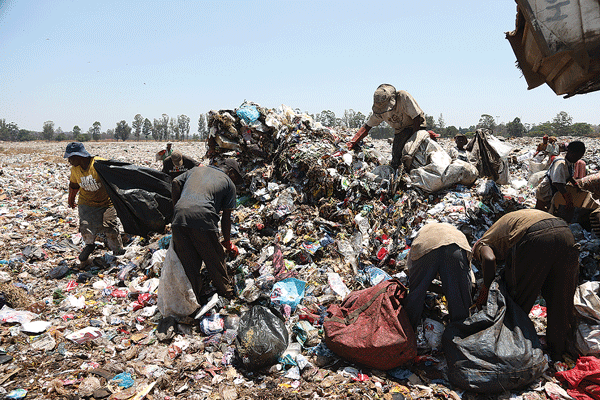
BY NOKUTHABA DLAMINI
Twenty-six-year-old Norman Mabhiza is among an army of scavengers foraging through waste at the Victoria Falls City Council’s Masuwe dumpsite.
Mabhiza and his colleagues pick anything they can salvage for sale to earn a living or even food to take back to their families.
They retrieve discarded cardboards, metallic objects, plastic tarps, wood and anything that can be recycled amid the foul smell at the dumpsite.
Among the scavengers are married couples, widows, orphans and young people.
“We have been injured by broken glass and other sharp objects while working here and even stumbled on aborted foetuses in the waste,” Mabhiza said.
“We live in hell because we have no choice.”
The scavengers keep a register of everyone operating at the Masuwe dumpsite and at the last count, there were over 100 people.
- Chamisa under fire over US$120K donation
- Mavhunga puts DeMbare into Chibuku quarterfinals
- Pension funds bet on Cabora Bassa oilfields
- Councils defy govt fire tender directive
Keep Reading
They use bare hands to flip over the items and put them into large plastic bags strapped on their heads and shoulders.
After filling up the bags, they empty them into big containers within the dumpsite.
For women at the dumpsite, the work is strenuous, but the choices are limited, said Khathazile Ncube, a 44-year-old-widow.
“Competing with men is difficult,” Ncube said.
“So to fill up my containers, it can take up to a month.
“I have been in this industry for a long time and all my eight children, the eldest being 16 were born when I was already doing this.
“They need to be fed, taken to school and be clothed. After the death of my husband some years ago, I started coming here more often.
“I also use the money I make here to take care of my mother.”
Depending on what material they find, scavengers typically earn US$7 to US14 per month from plastic, metal, wood and electronic waste.
They say even animal bones have value as they are used to make jewellery or as an ingredient in the manufacturing of floor tiles or concrete.
The scavengers have set up a makeshift shelter where they process and grade the waste that is said to fetch more money from recycling companies from as far as Harare.
They start chasing after the refuse trucks that arrive at Masuwe at dawn as they compete to grab the most valuable garbage. It would mostly be metals for sale, clothes to wear and food to eat.
Valentine Shoko, who has been scavenging at Masuwe for 18 years, said it can take up to a week to process waste they pick in a single day.
“The money is not enough compared to the risks we take and the effort that we put,” Shoko said.
“Some of our colleagues pick up food items that they take to their families despite the risks of poisoning.
“Everyone is forced to come here by the dire economic situation in the country.”
Shoko has nothing show for the 18 years he has been toiling at the dumpsite.
“I am still renting,” Shoko said resignedly.
“These buyers give us US$7 for these sacks and it takes over a month to refill because we are more than 100 here.
“So when the refuse truck comes to offload, some fail to even pick a single item due to the scramble.
“Our wish is to have a law that governs trading in these items so that we can survive.
Mkhululi Nyathi (34) and his wife Sazini Sibanda (30) say they start work as early as 5AM but still struggle to make enough money to support their family.
“We met here and we are raising our three children through this work. The money that the buyers give us is not enough,” Sibanda said.
“We are squatters because we cannot afford rentals and even buying food or clothes for the children is a challenge.
“We inhale dangerous fumes and even during the repackaging and we fear that it could damage our lungs.
“We also fear contracting the coronavirus.’’
No Covid-19 cases have been reported at the site, but no one has been tested either.
Global researchers, who studied municipal dumpsites elsewhere, found dangerous levels of cancer-causing dioxins in the waste.
Other common illnesses caused by working in dumpsites included diarrhoea, headaches, chest and stomach pains, typhoid and irritation of the skins, nose and eyes.
Nyathi said the economic meltdown caused by the outbreak of Covid-19 has also affected their business.
“Most recycling companies that buy waste from us have closed their doors,” he said.
“So fewer buyers are working but we just collect what we can and wait for anyone who comes along to buy.
A Victoria Falls City Council supervisor at the Masuwe dumpsite said they use various chemicals to kill flies and other insects, warning those could be harmful to humans.
“We just keep a close eye on how they operate for safety, and we also record their names in case of any casualty at our premises,” the official said.
In June, the World Bank said 1.3 million Zimbabweans had become extremely over in the last year following the outbreak of Covid-19 and this pushed the number of people living on the margins to 7.9 million.
— VicFallsLive











